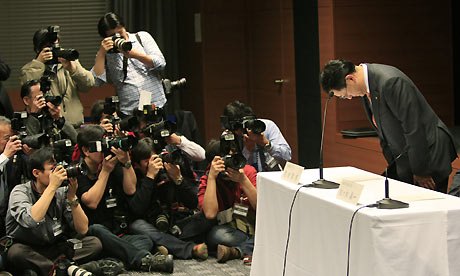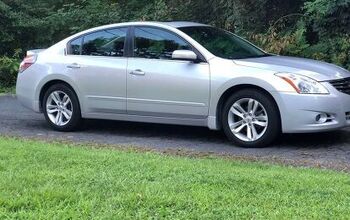Trade War Watch 13: Pedal Politics

Yesterday, a strange love-fest between U.S. Ambassador to Japan John Roos and Japan’s transport minister Seiji Maehara ensued. After their meeting in Tokyo, as reported by the Nikkei, the ambassador and the minister said that everything is hunky-dory, and that Toyota’s recent recalls won’t undermine relations between the U.S.A. and Japan. Which is odd in itself: Since when does a $15 gas pedal get a leading role on the world stage of international politics?
Ambassador Roos effusively told reporters that the recall issue ”in no way has any kind of direct or indirect impact on the strength of the bilateral relationship between the United States and Japan.” Who said it would?
Japan’s transport minister Seiji Maehara likewise said that Toyota’s troubles mean no harm to Japan’s relationship with the U.S.: “The issue shouldn’t damage the two countries’ relationship and shouldn’t hurt free and fair market competition.” Again, why should it?
Strange answers to questions nobody raised.
Kyodo News reiterated this morning in Japan that Toyota’s President Akio Toyoda will travel to the United States in March. Toyota spokeswoman Martha Voss said Toyoda ”would look forward” to the opportunity to meet with members of Congress when he visits the United States. The travel plans of the CEO of a car maker get more attention than a state visit.
There has been an odd amount of highest level governmental involvement with this issue recently, far beyond the regular regulatory ratcheting and the habitual grandstanding. The posturing is solely between the U.S.A, and Japan. Nobody in Europe, or China, which are just as affected by the recalls, turns Toyota into a political issue.
China’s state-owned news agency Xinhua couldn’t help but noticing today: “In a sharp contrast to media reports out of the US, voices of leniency and softened tones have emerged in China on the issue, with some people going as far as highlighting the massive safety recalls as a sign of ‘responsible business operations.'” China is Toyota’s second largest foreign market.
In Europe, where Toyota recalls 1.8m cars, the reaction is even more subdued. The German newspaper Die Welt yesterday cited a spokesperson of the powerful ADAC, Germany’s equivalent of the AAA: “The club does not have any complaints or claims from its members. There is no reason for panic.”
As commentator L’Avventura said: “It seems to me that a lot things are going to happen behind closed doors before the congressional hearings. The question is how it’s going to play out and how much of it is going to be predetermined and politically orchestrated.”
Out of the many possible explanations for the strange behavior, here is one of them:
Prime Minister Yukio Hatoyama had campaigned on a platform that contained moving all U.S. bases off Okinawa, or even out of Japan. The Okinawa issue had received a lot of play in Japan. In the last weeks, it turned quiet.
When U.S. Secretary of State Hillary Clinton complained with her Japanese counterpart Katsuya Okada about alleged discrimination of the Japanese cash for clunker program against American cars, it sounded oddly out of proportion. The number of cars affected wasn’t enough to fill a ship.
Now, the U.S.A. seems to have found a powerful pivot point, and Japan’s undivided attention.
As long as the U.S.A. sits on Okinawa, it doesn’t have to dump a lot of arms into Taiwan, a move that would make China increasingly grumpy. China already threatened to cut Boeing et al out of the Chinese market, after $6.4b of American arms made their way to Taiwan. China is estimated to need more than 3000 airliners worth $400 billion in the 20 years from 2009. Airbus already has the inside track in China and would be more than happy to fill the void.
Nobody claims Toyota doesn’t have problems. As many have said, they have had problems for years. Their problem management is a mess. However, the timing and intensity of the diplomatic activity should give reason for thought.
Implications of a $15 gas pedal …

Bertel Schmitt comes back to journalism after taking a 35 year break in advertising and marketing. He ran and owned advertising agencies in Duesseldorf, Germany, and New York City. Volkswagen A.G. was Bertel's most important corporate account. Schmitt's advertising and marketing career touched many corners of the industry with a special focus on automotive products and services. Since 2004, he lives in Japan and China with his wife <a href="http://www.tomokoandbertel.com"> Tomoko </a>. Bertel Schmitt is a founding board member of the <a href="http://www.offshoresuperseries.com"> Offshore Super Series </a>, an American offshore powerboat racing organization. He is co-owner of the racing team Typhoon.
More by Bertel Schmitt
Latest Car Reviews
Read moreLatest Product Reviews
Read moreRecent Comments
- Lichtronamo Watch as the non-us based automakers shift more production to Mexico in the future.
- 28-Cars-Later " Electrek recently dug around in Tesla’s online parts catalog and found that the windshield costs a whopping $1,900 to replace.To be fair, that’s around what a Mercedes S-Class or Rivian windshield costs, but the Tesla’s glass is unique because of its shape. It’s also worth noting that most insurance plans have glass replacement options that can make the repair a low- or zero-cost issue. "Now I understand why my insurance is so high despite no claims for years and about 7,500 annual miles between three cars.
- AMcA My theory is that that when the Big 3 gave away the store to the UAW in the last contract, there was a side deal in which the UAW promised to go after the non-organized transplant plants. Even the UAW understands that if the wage differential gets too high it's gonna kill the golden goose.
- MKizzy Why else does range matter? Because in the EV advocate's dream scenario of a post-ICE future, the average multi-car household will find itself with more EVs in their garages and driveways than places to plug them in or the capacity to charge then all at once without significant electrical upgrades. Unless each vehicle has enough range to allow for multiple days without plugging in, fighting over charging access in multi-EV households will be right up there with finances for causes of domestic strife.
- 28-Cars-Later WSJ blurb in Think or Swim:Workers at Volkswagen's Tennessee factory voted to join the United Auto Workers, marking a historic win for the 89- year-old union that is seeking to expand where it has struggled before, with foreign-owned factories in the South.The vote is a breakthrough for the UAW, whose membership has shrunk by about three-quarters since the 1970s, to less than 400,000 workers last year.UAW leaders have hitched their growth ambitions to organizing nonunion auto factories, many of which are in southern states where the Detroit-based labor group has failed several times and antiunion sentiment abounds."People are ready for change," said Kelcey Smith, 48, who has worked in the VW plant's paint shop for about a year, after leaving his job at an Amazon.com warehouse in town. "We look forward to making history and bringing change throughout the entire South." ...Start the clock on a Chattanooga shutdown.



































Comments
Join the conversation
If I get this right, the thesis of this article is that the US government is making a big deal out of Toyota's safety problems because it doesn't want to move the base out of Okinawa. You should rename this a Conspiracy Theory Watch.